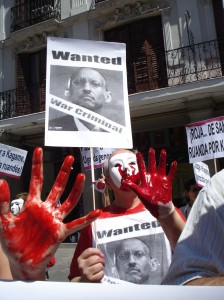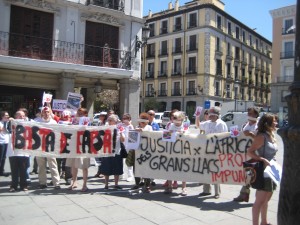 The challenge of facing democracy inside and international justice outside appears to become a costly exercise for the government of Paul Kagame. Within the space of a few weeks, it was first the outcry about the outcome of presidential elections held on August 9th, and we then have the seriously damaging leaked UN report on atrocities committed by the RPA/AFDL rebel forces on Hutu refugees and local Hutu populations in the Democratic Republic of Congo.
The challenge of facing democracy inside and international justice outside appears to become a costly exercise for the government of Paul Kagame. Within the space of a few weeks, it was first the outcry about the outcome of presidential elections held on August 9th, and we then have the seriously damaging leaked UN report on atrocities committed by the RPA/AFDL rebel forces on Hutu refugees and local Hutu populations in the Democratic Republic of Congo.Ann Garrison, a Californian independent journalist compiled a partial list of news outlets which have highlighted the content of the UN report as of 08.28.2010. These include Canadian Broadcasting Corporation, Reuters Africa, Agence France Press, Newsweek, New York Times, De Standaard, as reported in PressEurop, Channel 4 UK, Telegraph, Press TV, Washington Post, Seattle Times, Miami Herald, NPR. She says that the political cost of standing with Kagame is mounting by the hour.
As for the contested outcomes from the election, Paul Kagame had resorted to publishing in The Financial Times of Thursday 19th August where he stood. Using such news outlet confirmed what had been reported by The Guardian a while ago saying that he was working with PR firms to launder his regime’s reputation. If he is clean about allegations he is accused of by Rwandan opposition parties and human rights organizations one would wonder the true motives of such costly assistance.
He highlights for example that he has achieved reconciliation among Rwandans, and then what are the explanations to the thousands of refugees from all ethnic groups who continue fleeing the country. Unease has been particularly evidenced among his colleagues in RPF ranks in recent times and apparently doesn’t end. His reconciliation without tolerance appears to exemplify what happened to the assassinated vice president of the Green Democratic Party of Rwanda, Andre Rwisereka, the shot dead journalist of Umuvugizi Jean Leonard Rugambage, or General Faustin Kayumba Nyamwasa victim of an assassination attempt in South Africa.
Political parties which criticize RPF regime are until today excluded from legally operating in Rwanda. Victoire Ingabire, leader of FDU-Inkingi, is under house arrest since April. Her party has been denied registration because of false allegations against her of genocide ideology, genocide denial, and being associated with a terrorist group. The Green Democratic Party couldn’t get registered either. Me Bernard Ntaganda, Chairman of Parti Social – Imberakuri is in prison since June 24th.
Paul Kagame’s claim of economic growth is misleading because it intentionally obscures the exact picture of what he found in Rwanda in 1994. Rwandan electrification was among the highest in Africa before the arrival of RPF in power. This was also true for the number of hospitals and frequency of roads. There is no evidence of significant developments in these areas which was installed since. On these issues Paul Kagame provides a picture of a country which apparently didn’t have any infrastructure before 1994. He forgets that the same institutions which are praising him today for making tremendous economic progress had also appreciated the model of development of his predecessor.
In addition, the point he makes of continuous economic growth seems to say that no one could have achieved similar performance while the Rwandan government receives from donors 60% of its budget and its structures are in the hands of external experts. Could such achievement be reasonably attributed to him?
According to the PNUD, Rwanda ranks among the 15% countries most unequal. There is a need to compare elements or situations which are comparable. The same institution reports that the population which lives under the poverty line has passed from 47% previously to 60% under RPF leadership. Who benefit from current economic growth if any? It is Kigali residents who consist of Rwandan elites. 85% of the population is rural.
Democracy is a universal principle. One does not have to choose between food, freedom, and electricity which is only available to a very small fraction of the population, yet this after 16 years of RPF leadership. It is not up to the president to decide what is convenient to the people. Citizens should be responsible for their destiny and not Paul Kagame imposing them his.
 Justice is another fundamental and universal human right. For most Rwandans, their country has become like a prison where some of the inmates have the keys to get out but also back to their cells, whereas others are confined only to the space available inside its walls. Thousands have died unaccounted for at the hands of prison guards. The leaked UN report brings some hope of justice for the thousands who died in DRC running away from the RPA/ADFL forces in 1997-98. Their memory could then this time be publicly remembered.
Justice is another fundamental and universal human right. For most Rwandans, their country has become like a prison where some of the inmates have the keys to get out but also back to their cells, whereas others are confined only to the space available inside its walls. Thousands have died unaccounted for at the hands of prison guards. The leaked UN report brings some hope of justice for the thousands who died in DRC running away from the RPA/ADFL forces in 1997-98. Their memory could then this time be publicly remembered.

7 comments:
WWW0424
air huarache
true religion outlet store
nike blazer low
dallas cowboys jerseys
prada outlet
nike sale
salomon boots
nike roshe run
coach outlet
longchamp sale
kevin durant shoes
adidas stan smith
nike epic react flyknit
hermes handbags
nike cortez women
ferragamo sale
nike air max
louboutin shoes
michael kors handbags
asics shoes
dsquared2
superdry uk
nike outlet
ed hardy uk
ugg outlet clearance
coach outlet
ralph lauren polo
kate spade handbags
moncler jackets
supreme
longchamp
kd 11
nike shoes
ferragamo belts
huaraches
cheap jordans
golden goose sneakers
christian louboutin shoes
jordan shoes
curry 6
adidas superstars
kd shoes
nike shoes
adidas tubular
supreme clothing
nike air max
golden goose sneakers
michael kors handbags outlet
golden goose
air max 95
t8t20k6h47 t1c29m6a96 u3p72z9d36 v0s14g5m30 x8q30b1f99 j1o42c1f33
a1u47l7z52 i1h85p5t54 r5f73p5n19 u4t15l0y66 v7o09j4d55 t0l83z4e16
Post a Comment